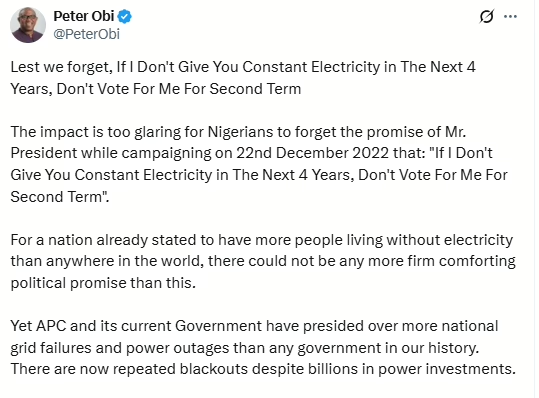With the 2027 general election rapidly approaching, former presidential hopeful Peter Obi has called on President Tinubu to honor his commitment not to pursue a second term if he fails to resolve Nigeria’s persistent power challenges during his first tenure.
Obi expressed this stance on his X account on Wednesday, September 10, following yet another collapse of the national power grid.
He criticized the ruling APC administration, asserting that it has overseen more frequent and severe power outages than any previous government in Nigeria’s history.
Recall the President’s pledge: “If I don’t provide you with reliable electricity within the next four years, don’t vote for me again.”
This promise, made during the campaign on December 22, 2022, remains a critical benchmark for Nigerians, especially given that the country reportedly has the highest number of people living without access to electricity worldwide.
Despite this, the APC-led government has presided over an unprecedented number of national grid failures and blackouts, even after substantial investments amounting to billions of dollars.
Historically, Nigeria has allocated more funds to power generation than countries such as Vietnam, Egypt, Indonesia, and Bangladesh, yet the results have been disappointing. While these nations have successfully doubled their electricity output-adding tens of thousands of megawatts to fuel economic expansion-Nigeria’s generation capacity has barely increased from 4,500MW to 5,000MW.
With an economy valued at approximately $200 billion, Nigeria stands to gain immensely from a robust power sector. Achieving a modest target of 10,000MW could potentially boost the nation’s GDP by 50%, catalyzing industrial development, creating millions of jobs, and revitalizing businesses. Instead, the government’s focus on projects like coastal road construction offers limited economic returns, while factories close, unemployment rises, and citizens endure frequent blackouts.
President Tinubu must urgently prioritize expanding electricity generation and distribution, particularly to empower small and medium-sized enterprises (SMEs), which are vital for job creation and economic growth.
A revitalized Nigeria is within reach.


















0 Comments